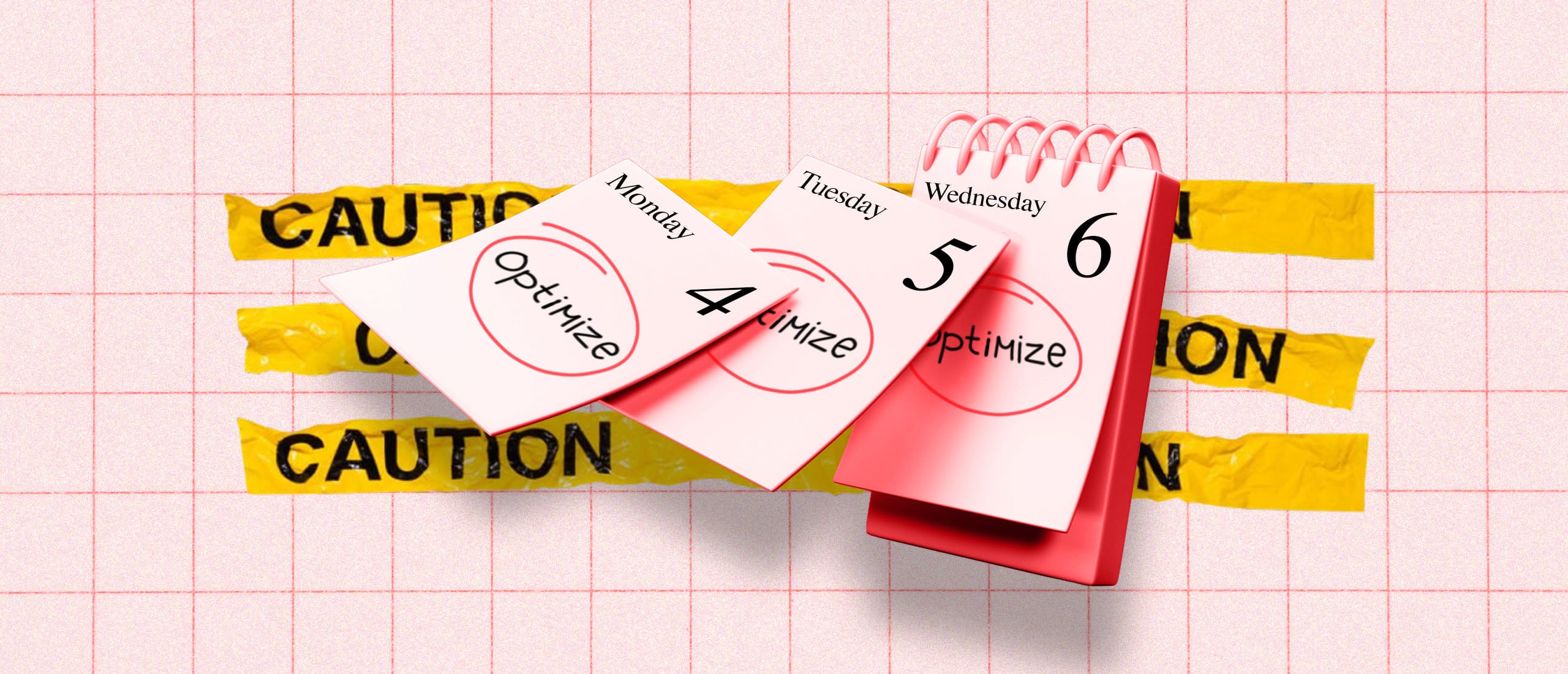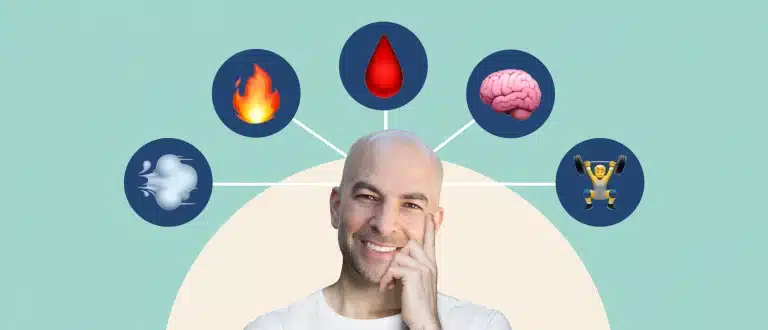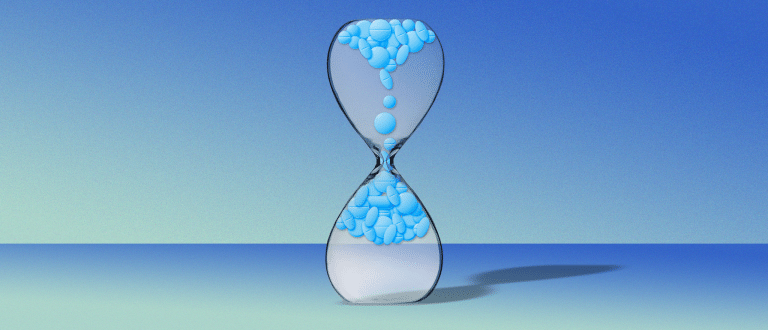Toxic Optimization: Your Longevity Protocol Shouldn’t Make Your Life Suck
- By Rebekah Harding
- Fact-checked by Joy Ferguson
- August 4, 2023
Another week, another outrageous hate-bait post from Project Blueprint founder Bryan Johnson.
On Monday morning, I opened my Instagram feed to a satirical (so he claims) list of relationship expectations the longevity-obsessed multi-millionaire sets on a first date: no pillow talk, scheduled sex, sleep alone, and a veggie-only diet.
What do his prospective partners get in return? “30 doctors, perfect liver markers, quantified erection capability, and vaginal rejuvenation.”
The post comes on the heels of a recent podcast interview with Natasha Graziano, in which Johnson says that he banks his calories in order to “save” enough to enjoy a meager plate of steamed veggies when he goes on a date. Sexy.
Johnson may be poking fun at himself in this post (and the interview, we can only hope), but the 45-year-old is notorious for his extreme two-million-a-year conquest to reverse his biological age to 18. His anti-aging protocol includes costly experimental therapies like young blood plasma transfusions, swallowing scads of expensive supplements, and routine preventative ultrasounds.
For his efforts, Johnson’s fans idolize him as the Chosen One. His haters call him a cash-burning fanatic. In the middle are plenty of folks who just shrug and think, “Well, if you have the money, why not?”
Health Optimization is a Growing Trend
While he takes it to the extreme, Johnson isn’t the only person who has gained notoriety for trying to live longer through self-optimization. In recent years, a fascination for longevity has exploded. Chris Hemsworth’s Disney+ series Limitless followed the actor as he swam in ice cold water, confronted his own mortality, and tackled chronic stress, all in an effort to understand his body’s limits and keep it working better, longer.
Experts like neuroscientist Andrew Huberman, Ph.D., and longevity doctor Peter Attia, M.D., have amassed cult-like followings on Reddit. Now they’re spreading their science-backed tips to increase your healthspan on platforms like The Oprah Winfrey Show and the Joe Rogan Experience.
And the rest of us mere mortals are following suit. Millions of us wear devices like fitness and sleep trackers, continuous glucose monitors, and breath analyzers to understand how our bodies are performing at any given moment.
We don’t just want to be better in the moment; we’re optimizing today to avoid disease and decline tomorrow. Case in point: Google searches for terms including “reverse aging,” “biological age,” and “longevity” have all doubled in the past two years.
To be clear, none of this is a bad thing. Biological age-reversing protocols like intermittent fasting, circadian rhythm regulating, and hormone optimization all contribute to a better health- and lifespan.
But extreme optimization can come at a much higher cost than draining your bank account, says sports psychologist John R. Evans, Ph.D, CMPC, the Director of Mental Conditioning for Sports & Performance at mental health and wellness company Blnd Health.
“Our lives can be broken into four quadrants: personal health and growth, relationships, work and school, and leisure,” Evans explains. “If you [over]-optimize your physical health, it can deteriorate your ability to live your values in the other three areas.”
There’s no official word for this growing trend, but we’re calling it toxic optimization, because it’s disturbingly similar to other health extremes, like orthorexia, that lead people to hold strict, and arbitrary rules.
“Orthorexia is a set of beliefs about healthy foods, exaggerated emotional distress in relationship to food choices that are perceived as unhealthy, and clinical impairment because of compulsive dietary behaviors and mental preoccupation,” says Marissa Chabai MS, BSN, RN, LPC, NCC, Director of Integrative Healthcare for Blnd Health.
Just as someone with orthorexia may moralize certain foods, and emotionally punish themselves for making “wrong” or unhealthy choices, extreme optimizers may feel a pang of dread when their social choices take momentary precedent over their health values.
To Optimize, Or Not to Optimize
Eager health optimizers share longevity-boosting tricks and protocols in subreddits like r/Biohackers and r/Longevity. Many of their tips, like completing a hormone assessment, trying cold exposure therapy, or upping your post-workout sauna sessions—are science-backed and require a low time commitment. But other hacks are all-consuming and rigid.
One Redditor in r/Biohackers said that his recent biological age test results have left him feeling “lost and devastated” after spending hundreds on testing, medications and supplements to be more on par with his decade-younger wife. Another poster questioned if they should give up longevity optimization after wondering if following their rigid protocol of extreme workouts, cold showers, and eating just one meal a day was worth the effort to live longer if they didn’t have a friends and a social life.
Many critics of Johnson also wonder if spending gobs of time and money on living longer is blocking him from living fully. And I think this is fair. After all, a strict 11 am dinner (yes, dinner) and 8:30 pm bedtime automatically excludes him from any evening events or get-togethers. And he recently served up the same veggie mush he has every day at his son’s 18th birthday party.
Living our values is central to a rich and meaningful life—and for many people, health is a core value, says Evans. “However, from the Acceptance and Commitment Therapy (a type of psychotherapy that focuses on creating emotional flexibility) lens, we should be pursuing our values vigorously, but holding them lightly.”
“We should be pursuing our values vigorously, but holding them lightly.”—John R. Evans, Ph.D, CMPC
Risks of Toxic Optimization
Followers of Johnson and other chronic optimizers who vigorously emulate the protocols of their chosen longevity messiah may discover other, more negative implications.
“Social comparison is a double-edged sword. It can inspire us to discover and adopt how others train, learn and perform that can benefit and enrich our lives,” Evans says. “But it can also get us stuck in the hopelessness of our ability to attain that level of performance or status, or in this case, push us too far at the expense of our relationships, work, leisure, and mental health.”
For the average person, this could look like skipping on a slice of cake at your kid’s birthday party because it doesn’t fit your current keto diet. Or, that you haven’t gone out with friends in months because your deep sleep optimizing protocol means you have to be tucked up in bed by 9 pm.
Help—I Think I Suffer From Toxic Optimization
Evans doesn’t knock people who want to optimize their health—in fact, he encourages it. To a point.
“We should all engage in activities to enhance physical health, because physical health enriches our lives as a whole,” says Evans. But if you’re spending the bulk of your energy and attention on your optimization efforts, it may be time to seek help from a therapist who can help you unpack and process whether your health fixation is becoming a problem.
Warning signs that prioritizing your health optimization as gone too far, according to Chabai:
- Your health is all you can think of. It’s the first thought you experience in the morning, it’s all you think about throughout the day, and you ruminate on it whenever you have downtime.
- Thoughts about your physical appearance and health distract you from being in the present moment at work, with your family/loved ones, or from engaging in other hobbies.
- It’s never enough. As soon as you reach one health goal, you’re formulating the next one.
- Important people in your life express concern.
Your protocol should be guidelines for a healthy, long life—not rigid rules, per Evans. Still, he acknowledges it can be difficult to break the habit of over-optimizing.
Your North Star in finding balance: longevity experts like Attia. He’s a pro at incorporating the philosophy of balance. He encourages viewers to carefully weigh their choices and trade-offs to live a fulfilling life while still optimizing their health.
For example, Attia is strict with his alcohol consumption. He told Tim Ferriss that he only drinks a maximum of three times a week—and no more than two drinks each day. But that doesn’t mean he won’t lay off on the optimization for at an occasional dinner party amongst friends.
Attia told Ferriss that he received some criticism after posting about a “rancid night of sleep” data he recorded after a late-night dinner party with friends.
“I posted on Instagram that my sleep was comically bad. The reason was we had friends over. We drank, we ate,” Attia says. “And I’d do it again. It was a fantastic night. You just have to be deliberate and thoughtful about the choices and trade-offs you make.”
Testing your hormones is an affordable—and healthy—way to optimize longevity.

















